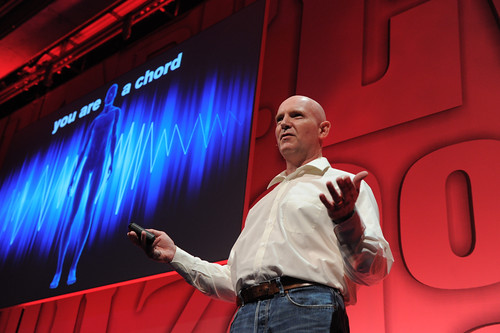TED University lets members of the TED audience take the stage — because TEDGlobal attendees are often just as extraordinary as the speakers. TEDGlobal University Session 1, held at Keble Theater and a couple of lively simulcast rooms, packed in more than a dozen short talks. A few highlights:
Julian Treasure, pictured above (and watch his TEDTalk from last year), told some fascinating stories about how sound affects us in ways we don’t recognize — with a frightening little section on the dangers of constantly having your headphones plugged in, from noise-induced deafness to “schizophonia,” the disconnect between what you see and what you hear. Takeaway: “Our ears aren’t made for listening — they’re made for hearing. We learn how to listen.”
Jessica Pryce-Jones shared her research on happiness at work — pre- and post-recession. Over a five-year study of thousands of subjects, she and her team have found the secret of happiness (at work, at least): a sense of contribution. If you feel needed, effective and in control, you’re more motivated, more confident, and … happier. Takeaway: “We’ve found that having control at work has as much effect on your life as smoking or not smoking.”
TEDGlobal Fellow Walid Al-Saqaf shared a handy web tool he built to get around censorship in his home of Yemen. Alkasir (which means “the Circumventor”) senses web traffic that a nation or entity has blocked, and routes it through an anonymizer, while allowing uncensored traffic to pass through quickly. Takeaway: “Yemen censored for one reason: because I was fair to everyone.”
Jessa Gamble gave a fascinating talk on sleep and the body clock. Gamble herself lives near the Arctic Circle of Canada, where 24 hours of sunlight each summer prompts a burst of manic activity to prepare for the dark winter. Her research subjects, who commit to sleep studies lasting for several months in a room cut off from the outside world, talk about how productive they become once their body clock has reset itself to its natural rhythm. Takeaway: “The body clock is one of the most underrated forces on our behavior.”
Amitai Etzioni delivered a quietly fiery talk on our economic values and how, soon, they must shift. Western society has come close to the top of Maslow’s pyramid — our basic needs for food and shelter are met, and we’re searching for fulfillment in other ways. But many of us are stuck in the old habit of looking for fulfillment and happiness through shopping, acquiring, owning. Takeaway: “We must move on to other sources of contentment.”
Ruth Ann Harnisch closed the session with a neat little talk called “6 Things I Learned in 6 Months of Doing Nothing.” This overbusy modern woman just … unplugged for 6 months. No meetings, no running around, no nothing. It gave her a lens to look at her busy life and figure out what was really important, which we often miss when we’re distracted doing a million things we think are important. Takeaway: Silence. Harnisch led the audience in a 10-second sample of doing absolutely nothing. It felt fabulous. Try it yourself …

Comments (3)